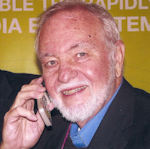I recently attended a high tech educational conference where a popular topic was what to teach those in engineering and technology programs. That is always a hot topic and usually results in a major debate but with no outcome, resolution or change. So the status quo continues. Business as usual for academia.
I used to teach in academia so I am painfully aware of the continuous big disconnect between what is being taught versus the real world needs. There seems to be a permanent skew or at best a lag between industry needs and academia. And frankly I cannot think of a way to change that given the extreme rigidness of the institutions, the faculty and their accrediting bodies. If you think change is difficult in industry, just take a look at what it takes to change the curriculum or any course content at a college or university. Brutal.
Anyway, an always interesting topic is what new courses should be added. And the big debate about what to take out if anything new is added. Most curricula are topped out at a maximum number of semester hours and departments cannot go over that limit without materially extending the program beyond the traditional four years, not to mention making the program even harder and more expensive for students already in overload. So adding any new course forces you to remove another.
I heard one professor admit that they recently dropped the requirement of statics and dynamics courses in EE programs. These topics have traditionally been required of all engineering majors. They make sense for mechanical, civil, and architectural engineering but not so much for EEs. Have you ever used your statics and dynamics knowledge in your EE work? Me neither. The college did kept the requirement for thermodynamics which is generally applicable for most EEs. The school then decided to add more software and programming courses in place of statics and dynamics. An interesting choice and probably on target.
EE is a discipline that is software intensive these days so software does make sense. The follow on question concern is what to teach. Some teach Java, others Matlab or other math and simulation software. An introduction to EDA is part of some programs. My informal survey of languages taught reveals no one software dominates. It is all over the place and language selection is almost at the whim of the professors teaching the courses rather than any survey of what industry needs or uses. C (& C++) is usually taught along with any embedded controller design course, as it should.
Another debate that is continuously in play is teaching just the fundamentals versus adding more modern practical technology courses. Some in the “just fundamentals” camp say it is not the job of the college to teach the latest practices. The goal is to build a base that becomes the foundation for future OJT or graduate education. Fundamentals are great as any EE will tell you but I feel that it is almost criminal to turn a graduate loose in industry without some practical look at real world technology. Maybe there is a way to integrate examples of modern practice and technology into existing fundamentals courses, if the professors know what to teach.
Another question is what other topics should be taught? Circuit theory courses still dominate early years in the program but shouldn’t other fundamentals be added. Communications is an example. Wireless and networking are a part of just about all electronic products and applications today. Communications should be a basic electronics introductory course in all curricula.
Another is test and measurement. A general introduction to modern test instruments and how to make common measurements is critical knowledge. It is what engineers do these days. I have actually met graduates who could not use a scope but could do complex math in circuit analysis. And what about topics such as PCB design, video, DSP, and FPGAs. Is the emphasis wrong in EE programs? I have to wonder if the colleges and universities really know what is needed. I hope they talk to industry but I sensed at this conference that many do not. I have often thought I should make up a list of key things they don’t teach in school and send it to academia. I am sure most of you have your own list.
Finally, I also got the impression that academia does not embrace the idea of lifelong learning. For example, how to professors get continuing education? Where does it come from and who pays? These days professors are big users of the Internet as a learning source as are most practicing engineers. But hopefully, professors are also reading the magazines, going to the conferences and taking the many webinars that are so plentiful today. I worry that they are not.
Academia is an island that seems separate from the industry that employs its graduates. Maybe I am wrong about this but the evidence seems to say otherwise. On the other hand maybe it is industry’s fault for not speaking up about their specific needs. Or has industry become so diverse and specialized that the current “generic” graduates no long fit the jobs? No wonder colleges do not know what to teach.

